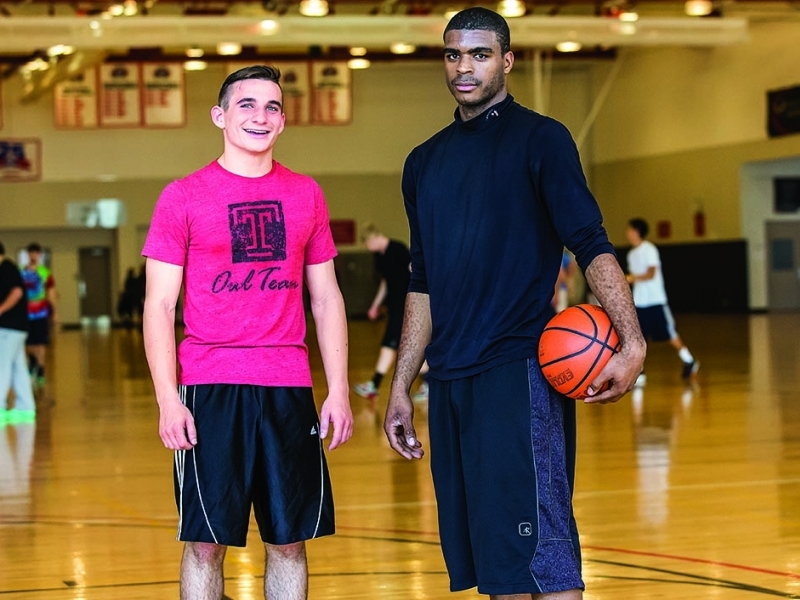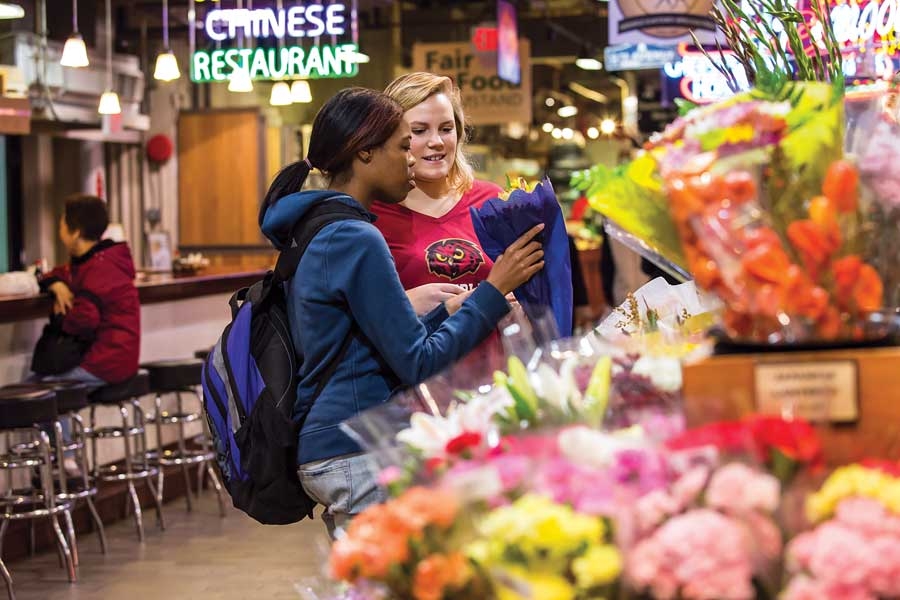Brotherly Love
<p>Temple students mentor college-age adults with intellectual disabilities through the Academy for Adult Learning.</p>
Photography By:
Joseph V. Labolito
Story by:
Kate O'Neill

Mack Caruso (left), Class of 2017, is both a mentor and a "brother" to Juan Laserre.
Juan Laserre and Mack Caruso are in many ways a study in contrasts. Juan, 24, is tall, African-American and a little awkward in conversation. Mack, a Temple sophomore, is short—“5′8″ on a good day,” he says—pale and gently confident. Mack grew up in a close-knit family in Cranberry Township, Pennsylvania, an upper-middle-class suburb of Pittsburgh. Juan is from South Philadelphia but no longer in contact with his biological family “because of stuff [he] went through as a kid.” Juan has an intellectual disability; Mack does not. And in the way that opposites often do, Mack and Juan complement each other beautifully.
The pair met in fall 2013 through Temple’s Academy for Adult Learning (AAL), a two-year program that provides college experience and vocational skills to adults with intellectual disabilities who would otherwise not be able to participate in higher education. Each academy student is mentored by a matriculated Temple student.
“When we first met, it was not an instantaneous connection,” Mack says.
“I gave him a look,” Juan adds, squinting his eyes in imitation of the way he glared at Mack when they were introduced at the event where academy students and Temple student mentors get to know each other and are matched in pairs.
“We both had our apprehensions,” Mack says. “But when he shot me that look in the beginning, I thought, ‘That’s the guy I want to be matched with. I want to see that look turn into a smile.’” He glances at Juan, who this time gives him a grin.
The Edge of the Cliff
The Academy for Adult Learning got its start in 2004 when Temple’s Institute on Disabilities, which is located in the College of Education, decided to launch a program for young adults with intellectual disabilities.
“We gathered a group of people with disabilities and family members and asked them what they would want,” says Kathy Miller, director of the academy. What they wanted was a program that offered an authentic college experience.
“Temple was the perfect place for this to happen because of our attention to diversity and attitude of inclusion,” Miller says. Two years later, in 2006, the first cohort of 10 academy students began attending Temple. In the nine years since, 57 intellectually disabled adults have completed the program. Academy students, who are between 18 and 26 years old, take two classes per semester and attend a weekly seminar. During their final semester, they also intern somewhere on campus, such as the Wellness Resource Center, Conwell Inn or Computer Recycling Center.
There are more than 225 programs at colleges and universities across the U.S. that help young adults with disabilities transition into life after high school, and Temple’s academy is one of five similar programs in Pennsylvania. And yet far more students apply than AAL can accommodate. The program does no advertising and still has between 40 and 50 applicants every year for 12 spots. Based on U.S. Census data, Miller estimates there are over 5,000 eligible adults with intellectual disabilities in the five counties the academy serves.
“Imagine if we advertised,” she says. “There’s a big need and a huge waiting list for adult services.”
The Individuals with Disabilities Education Act mandates that people with disabilities have access to public education from age 3 through 21. After that, Miller says, their options are few: “participating in sheltered workshops, sitting at home watching TV not doing anything. Maybe they have a job if their family can make that happen; maybe they volunteer. But a lot of students build skills in high school, and then it all stops. Then they just fall off the cliff.”
Back from the Brink
Lianne Mapp had fallen off the cliff. She attended Cheltenham High School in Wyncote, Pennsylvania, until she was 21, and then “for two years didn’t really do anything,” says Linda Mapp, Lianne’s mother. Linda, who works at an art store, brought her daughter to work with her when she could, and Lianne spent a couple of hours a week at a social group for adults with disabilities. “But she basically stayed at home,” Mapp says. Lianne, now 23, began attending AAL this fall.
Like all academy students, Lianne takes two classes each semester. As an AAL “freshman,” both of her classes are through Temple’s Pan-African Studies Community Education Program (PASCEP), which offers noncredit courses to the community.
“I’m getting out of my comfort zone,” says Lianne, who is soft-spoken and pretty, two pink highlights in her hair framing her face.
Claire Spurrier, Class of 2015, is Lianne’s mentor and an occupational therapy major from Baltimore. “She’s not afraid to meet people,” Spurrier says. “And she gets her homework done the day it’s assigned.”
“I don’t mind homework,” Lianne adds.
Second-year students enroll in one class through PASCEP and a second traditional Temple class. Academy students have taken classes in 11 of Temple’s 17 schools and colleges, courses that range from World Music and Culture to Medical Terminology. The professor and academy student work together to come up with an accommodation plan so the student can participate as fully as possible.
“This could mean using assistive technology such as an iPad that reads aloud,” says Titania Boddie, AAL’s program coordinator, “or taking an oral instead of a written exam. It varies according to the student’s abilities and the syllabus.” In addition, a Temple student attends class with and tutors the academy student.
According to Kathy Miller, AAL is beneficial not just to academy students but also to the Temple students who work as mentors and tutors.
“It’s a win-win,” she says. “What better way for emerging professionals to understand what it means to have a disability? When they’re physicians, educators and businesspeople, they’ll draw on this experience to see there are more similarities than differences between people.”
Mack agrees. “It’s made me a far more receptive person,” he says. “It’s helped me be more mature. And Juan teaches me something every time we play basketball.”
“I wouldn't just say he's my mentor. He's my brother.”
-- Juan Laserre, student, Academy for Adult Learning
Breaking the Fall
In conversation, Mack quietly asks questions to draw Juan out, helping him clarify what he means. But on the basketball court, Juan is the one at ease.
He dribbles effortlessly across the court; flops dramatically to the ground when an opposing team member bumps into him; walks backward, smiling at the guy he’s guarding. Mack works harder, his face bright red. He’s scrappy and small; Juan is all tall confidence and grace.
“I don’t think I’ve won a single game against him,” Mack says later.
“This is our place,” Juan adds. “Where we come to clear our heads, talk about issues . . . it’s our sanctuary.”
According to Boddie, these relationships are the foundation of the academy.
“Mentors act as role models,” she explains. “They encourage their mentees to make choices on their own. With the support of their mentors, academy students develop confidence, so that by the time they graduate, they can go off on their own.”
They do this, essentially, by hanging out.
Claire and Lianne like to go to Center City and people watch on Main Campus. “We both love sushi and shopping and music,” Claire says. Together they also joined the Main Campus Program Board, which plans events for students.
Juan and Mack play basketball and go to football games. One afternoon, they try rock climbing at Pearson Hall. Juan scrambles easily up the fiberglass wall, then rappels back down to the bottom. But his face is bathed in sweat, and he strips off the harness and says he does not want to do it again.
“I’m afraid of heights,” he confesses.
Mack encourages him to continue.
“The worst thing that’s going to happen is that you’ll fall.” He pushes his foot into the cushions that line the floor, reminding Juan there’s something there to break his fall.
“My role is facilitating, whether it’s engaging in conversation or introducing ourselves to people or taking trips off campus,” Mack later explains. “The progress he’s made in the past year, the independence he’s gained—it’s amazing.”
“He keeps me out of trouble,” Juan says, “and points me in the right direction. We’re like brothers. I wouldn’t just say he’s my mentor. He’s my brother.”
Strong Foundations
In a windowless classroom on the fourth floor of Ritter Hall, a dozen students gather around a conference table, chatting noisily before class starts. This is one of two daylong AAL seminars held each week, one each for first- and second-year students.
Before they get started, Jack Badger, AAL’s coordinator of student supports, asks if anyone would like to meet with a state legislator to discuss people with disabilities who want to work.
“Like me,” says a student wearing combat boots, her curly hair long on one side, cut short on the other. “I want to work.”
“And you will,” Badger says. “You will.” Preparing students for employment is another important component of AAL.
The second-year seminar focuses on career goals and writing resumes; the internship provides hands-on experience. And graduates leave the program with a portfolio that includes a resume, cover letter and template for writing thank-you notes after interviews.
More than 70 percent of academy graduates find jobs after completing the program, a much higher number than average. According to the U.S. Census Bureau’s American Community Survey, only 23 percent of adults with intellectual disabilities are employed.
“I’m hoping this will lead to some kind of employment, something she can do that will make her feel fulfilled in her life,” says Linda Mapp of her daughter, Lianne. “Before Temple, she stagnated. Now she’s already looking ahead to what she can do next. Now I have hope that Lianne will find her place.”
When asked what he would like to do after graduation, Juan says he has not yet figured out a plan. “I’ll do my internship next semester,” he says, looking at Mack, “and then talk it over with this guy.”
